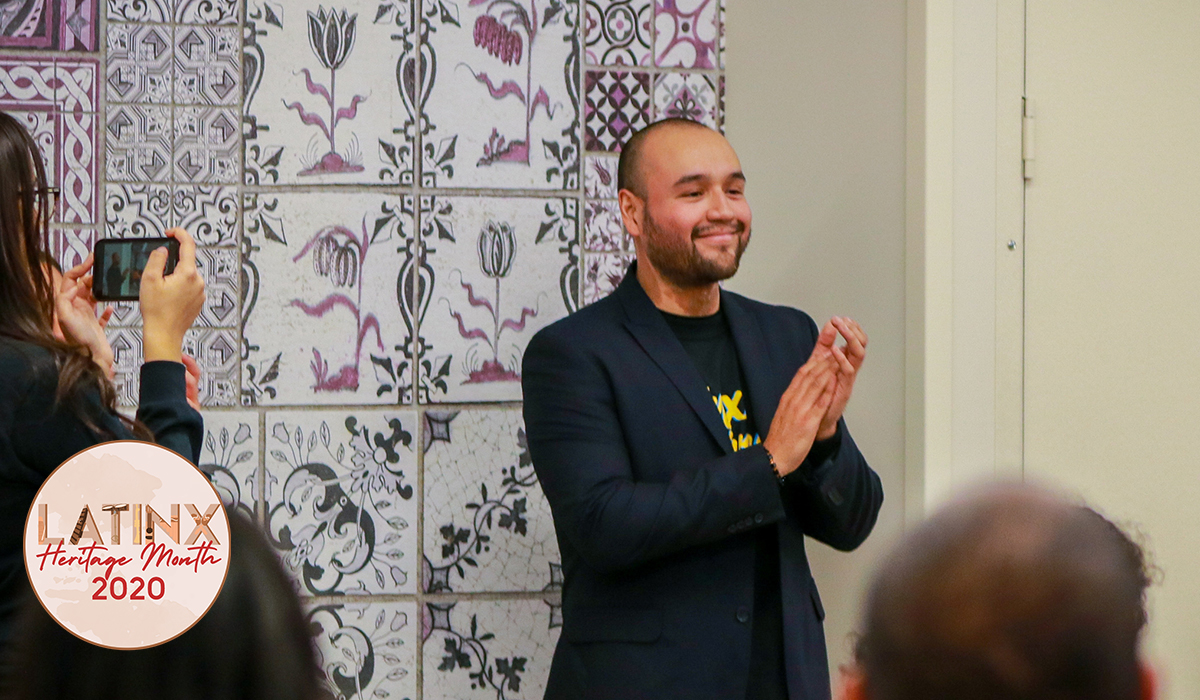For Javier Solorzano Parada, ’16, MA’18, the dream of attending U-M began when he took part in a program called Maximizng Academic Success. The initiative brought Latinx identifying students from U-M into his middle school in Monroe, Michigan, to inspire them to continue their education following high school. Parada saw college in his future, but had far bigger challenges than most of his peers for achieving that goal.
He spent his teenage years shuffling between relatives and friends after his mother was deported back to Mexico when he was in seventh grade. (He came to the country at age 7.) He was allowed to remain as a permanent resident, who would then become eligible for full citizenship five years later, which he attained.
Despite the hardships, Parada persevered and applied only to U-M his senior year, determined to be a Wolverine. Though initially rejected, he spent his first year at Eastern Michigan University earning strong enough grades to transfer to U-M for his sophomore year.
Now a first-generation graduate with two U-M degrees (his master’s is in higher education), Parada’s life has come full circle. Today, he serves as the program manager for the office of Multi-Ethnic Student Affairs (MESA) as well as the adviser for Latinx Heritage Month, which is currently being celebrated on campus with a variety of events through Oct. 13.
Michigan Alumnus recently caught up with Parada for a virtual chat.
What was your student experience like at U-M?
My experience as a first-gen Latinx, and a formerly undocumented student, was a unique one. It was a 360-degree flip from the world I came from. I really had to think about how I was going to navigate my whole undergraduate experience. I wanted to take all the learning and grow it to the next level. I co-founded an organization called PILOT, which focuses on leadership development and campus engagement, primarily for first-generation and underrepresented students. I also joined a fraternity and worked with the Center for Educational Outreach (CEO). I was fairly active.
How did you connect with U-M’s Latinx community?
It took a while. Back then, a lot of Latinx students were looking for a place that would support us on campus, and then slowly, we began to realize we should support each other. I’ve always had mentors and reached out to others to talk about my experience. My Latinx community became the folks who were willing to listen to me and touch base. Now there are many structures to support students at U-M, and we can share information a lot quicker through social media and email.
Who were your mentors at U-M?
I worked at CEO and they became a big family for me. When I was graduating as an undergrad, they supported me getting my mother into the country. She had not been back in 10 years since she was deported. The staff wrote letters of support and when she was able to come, they hosted a lunch with her favorite meal: Chinese food. It was an amazing moment.
What made you pursue working with MESA?
I felt like MESA would allow me to start my career in a place where I could show up and be who I am, while also allowing folks to think about their own identity. I wanted to work with others to create programming that would not only support the community, but also the folks who were putting it together. I also wanted to be a natural support system for the students. The students will ask me if they are taking the right classes or looking for the right internships. I like being that staff person they can check in with randomly.
How are you continuing to celebrate your identity as an alum?
During the fall season, I look out for the Latinx Alumni Tailgate. It is really nice to see who else from the community graduated from U-M. I would encourage everyone to look at all the Latinx Heritage Month events happening at U-M. I have learned on the planning committee that when students are committed and feel supported, the boundaries are not there. Latinx Heritage Month has drawn hundreds of students, faculty, and staff together virtually in the last weeks. I would encourage all students to participate. They can also check out all the other heritage months we celebrate at MESA.
Natalie Kittikul, ’11, is the senior program assistant for University relations and student engagement at the Alumni Association.





